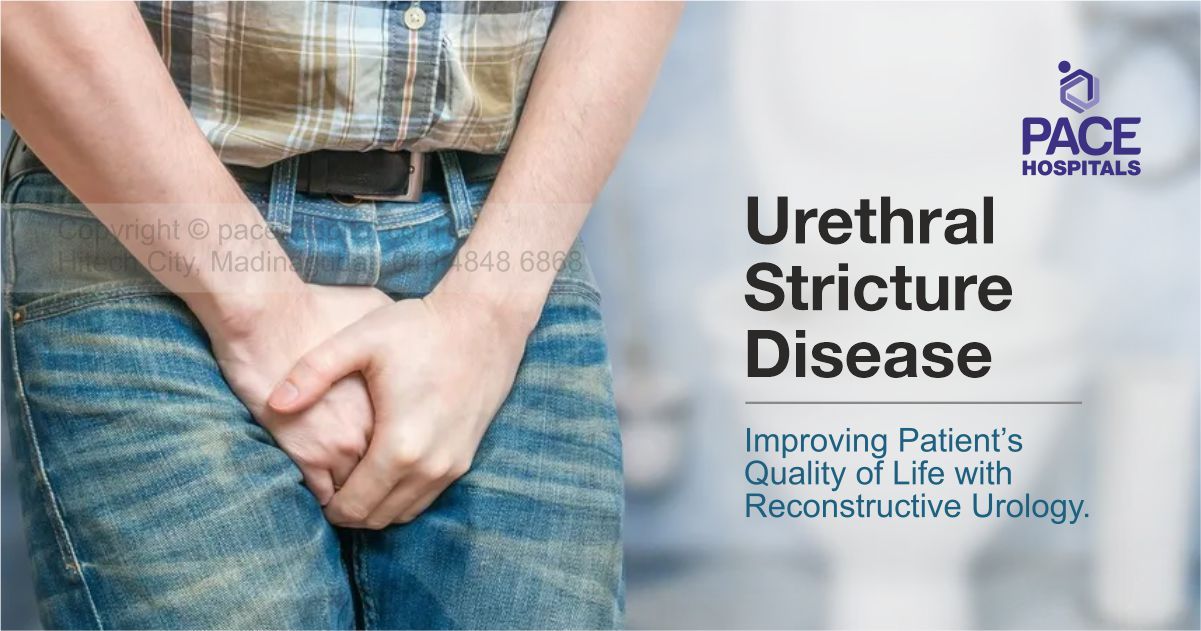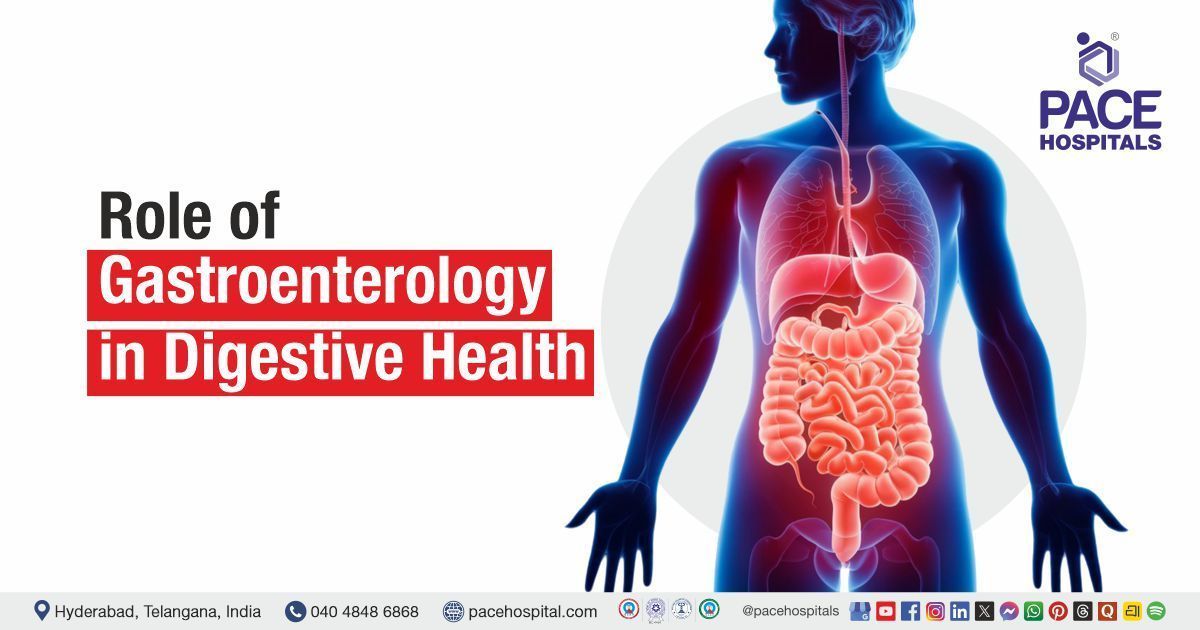Urethral Stricture: Advanced Reconstructive Urology for Urinary Health
PACE Hospitals
Written by: Editorial Team
Medically reviewed by: Dr. Abhik Debnath - Consultant Urologist, Andrologist & Kidney Transplant Surgeon
Urethral Stricture Disease is are common yet overlooked urological condition where the urethra (urine passage) becomes narrowed due to scarring or injury, causing difficulty in urination, pain, and recurrent infections. The condition can significantly impact a patient’s daily life, leading to discomfort, anxiety, and, if untreated, even kidney problems.
At PACE Hospitals, Hyderabad, our team of reconstructive urologists offers the latest surgical and minimally invasive treatments for urethral strictures. With a focus on restoring normal urinary function, reducing recurrence, and improving overall quality of life, PACE Hospitals is recognized as a leading center for urethral stricture treatment in South India.
What is Urethral Stricture Disease?
A urethral stricture is a narrowing caused by scar tissue formation anywhere along the urethra, from the bladder outlet to the tip of the penis. This narrowing restricts or slows the urine flow, causing symptoms like:
- Weak or slow urinary stream
- Painful urination
- Dribbling or incomplete emptying
- Recurrent urinary tract infections
- Blood in urine or semen
- Painful ejaculation or pelvic discomfort
Strictures are far more common in men due to the longer urethral anatomy and are rare in women and children.
Common Causes of Urethral Stricture
Although the exact cause isn't always clear, urethral stricture most frequent triggers include:
- Trauma to the pelvis or perineum (e.g., road accidents, fractures)
- Previous catheterization or medical instrumentation
- Urinary tract infections, especially sexually transmitted infections like gonorrhea or chlamydia
- Radiation therapy for prostate or pelvic cancer
- Scarring from prior surgeries (e.g., prostate, hypospadias repair)
- Chronic inflammation or repeated infections
Men who have undergone prostate cancer treatments or urinary tract surgeries face an increased risk of developing a urethral stricture.
Symptoms of Urethral Stricture Disease
Symptoms often worsen slowly as the narrowing gets worse:
- Reduced or weak urine stream
- Straining while urinating
- Feeling of incomplete bladder emptying
- Pain or burning sensation
- Dribbling or split urine stream
- Blood in urine or semen
- Recurrent urinary tract infections
- Swelling of the penis or lower abdomen
- Inability to pass urine (acute urinary retention) in severe cases
If left untreated, strictures can cause bladder damage, infections, stones, and even kidney failure.
Diagnosis of Urethral Stricture Disease
Accurate and timely diagnosis is essential for effective management of urethral stricture disease. At PACE Hospitals, we use a combination of advanced diagnostic techniques, which includes the following:
1. Uroflowmetry
A non-invasive test that evaluates the urine flow rate and pattern to detect possible obstruction.
2. Retrograde Urethrogram (RUG)
RUG is a X-ray imaging studies used to examine the urethra, the tube that carries urine outside of the body.
3. Urethroscopy / Cystoscopy
Direct visual examination using a fine scope to evaluate the inner urethra.
4. Ultrasound or MRI Urethrogram
Provides detailed imaging of the urethral anatomy and surrounding tissues.
5. Urine Tests & Culture
Detects urinary infections or inflammation that may contribute to the stricture.
Treatment Options for Urethral Stricture Disease
Treatment choices for urethral stricture disease may ranges from less invasive, temporary solutions to definitive surgical reconstruction. The best choice depends on the stricture's location, length, and severity.
Common treatments include:
Urethral Dilation
A minimally invasive method used to widen a narrowed urethra using special instruments.
- Best for short, mild strictures.
- Quick procedure but recurrence is common.
Internal Urethrotomy (DVIU – Direct Vision Internal Urethrotomy)
A small internal incision is made using a cold knife or Holmium laser to widen the stricture.
- Suitable for short strictures (<1 cm).
- Outpatient procedure; minimal pain.
- Recurrence possible; repeat treatment may be required.
PACE Hospitals uses Holmium laser urethrotomy for high precision, minimal bleeding, and faster recovery.
Urethroplasty (Open Reconstructive Surgery)
This is the gold standard for definitive treatment, especially for long or recurrent strictures.
Performed by reconstructive urologists at PACE, this involves:
- Removing the scarred section (excision and primary anastomosis), or
- Reconstructing the urethra using buccal mucosa grafts (tissue from the inner cheek).
Types of Urethroplasty:
- End-to-end anastomotic urethroplasty: For short bulbar strictures.
- Substitution urethroplasty: Uses grafts for long or complex strictures.
- Staged urethroplasty: For patients with severe fibrosis or prior failed surgeries.
Success rate: Approximately 85–90% at 5 years (significantly higher than endoscopic options).
Recovery: Catheter for 2–3 weeks, return to normal activities in 3–4 weeks.
Cost of Urethral Stricture Treatment at PACE Hospitals, Hyderabad
PACE Hospitals provides transparent, affordable, and patient-friendly pricing for all reconstructive urology procedures.
| Treatment Type | Approximate Cost (INR) | Approximate Cost (USD) | Details |
|---|---|---|---|
| Consultation & Diagnostic Tests | ₹2,000 – ₹5,000 | $25 – $60 | Includes examination, uroflowmetry, and basic investigations. |
| Retrograde Urethrogram (RUG) + Urethroscopy | ₹4,500 – ₹9,000 | $55 – $110 | Imaging & endoscopic evaluation for correct diagnosis. |
| Urethral Dilation / Laser Internal Urethrotomy (DVIU) | ₹45,000 – ₹85,000 | $540 – $1,000 | Day-care or short-stay procedure. |
| Single-stage Urethroplasty | ₹1,60,000 – ₹2,75,000 | $1,900 – $3,300 | Gold-standard reconstructive surgery for long or recurrent strictures. |
| Complex / Staged Urethroplasty | ₹2,50,000 – ₹4,00,000 | $3,000 – $4,800 | Gold-standard reconstructive surgery for long or recurrent strictures. |
| Post-op follow-up & uroflowmetry | ₹1,000 – ₹2,500 | $12 – $30 | Routine checkup every 3–6 months. |
Final cost depends on the complexity of the structure, its length, and the patient's disease evaluation. PACE Hospitals gives personalized cost estimates after a consultation with the reconstructive urology team.
Reconstructive Urology at PACE Hospitals
PACE Hospitals is a pioneer in reconstructive urology in Hyderabad, providing advanced treatment for complex disorder of urethral, bladder, and genital.
Key highlights:
- Expert Urologists: Our team comprises highly skilled reconstructive surgeons with advanced expertise in microsurgical and graft-based urethral reconstruction.
- Advanced Laser Technology: Holmium Laser system are used to perform precision urethrotomy with minimal tissue stress and speedier recovery.
- Comprehensive diagnostics: Includes Retrograde urethrogram (RUG), magnetic resonance imaging urethrogram, and 3D imaging for individualised planning.
- Post-surgical Rehabilitation: Includes uroflowmetry tracking and bladder training for sustained recovery.
PACE’s reconstructive urology outcomes have been among the best in India, with a >85% long-term success rate and improvement in patients' quality of life.
Prevention Tips for Urethral Stricture Disease
While not all strictures are preventable, you can reduce risk by following these measures:
- Avoid pelvic injuries and use seat belts.
- Treat urinary infections promptly.
- Practice safe sex to prevent sexually transmitted diseases.
- Avoid unnecessary or prolonged catheter use.
- Stay hydrated and maintain regular urination habits.
- Avoid self-catheterization unless instructed by a doctor.
Prognosis and Quality of Life
With timely diagnosis and proper surgical management, most patients recover completely.
After successful urethroplasty at PACE Hospitals:
- Urine flow improves greatly.
- Recurrent infections subside.
- Pain and strain subside.
- The quality of life, confidence, and sexual function improve dramatically.
Frequently Asked Questions (FAQs) on Urethral Stricture Disease
What is urethral stricture disease?
It is a narrowing of the urethra due to scarring, injury, or infection, leading to urinary flow obstruction.
What causes urethral stricture?
Common causes include trauma, prolonged catheterization, infections (gonorrhea, chlamydia), radiation, or previous pelvic surgery.
What are the warning signs of urethral stricture?
Weak urine stream, straining, incomplete emptying, UTIs, blood in urine, and pain during urination are key signs.
How much does urethral stricture treatment cost in Hyderabad?
Depending on complexity, treatment ranges from ₹45,000 for endoscopic procedures to ₹4,00,000 for complex reconstructive surgeries.
Is urethral stricture completely curable?
Yes. With surgical reconstruction and proper follow-up, most patients are cured permanently.
Can strictures recur after treatment?
Yes, strictures can sometimes recur after treatment, but with regular follow-up and early detection, major complications can be avoided.
Who is most likely to develop urethral stricture disease?
Men above 30 years, especially those with prior urological procedures or infections, are most affected.
How is urethral stricture diagnosed at PACE Hospitals?
Using uroflowmetry, retrograde urethrogram, urethroscopy, and MRI urethrogram for precise mapping.
What treatment options are available at PACE Hospitals?
Treatment of urethral stricture disease include urethral dilation, laser urethrotomy (DVIU), and open urethroplasty performed by expert reconstructive urologists.
How successful is urethroplasty surgery?
PACE Hospitals achieves 85–90% success, ensuring long-term relief and improved urinary flow.
What is the recovery time after urethroplasty?
Most patients return to normal activity within 3–4 weeks, with catheter removal around 2–3 weeks post-surgery.
Can urethral strictures cause kidney damage?
Yes. Untreated urethral strictures can lead to urine retention and increased pressure on the bladder and kidneys, leading to damage to the kidneys.
Conclusion
Urethral Stricture Disease is a serious but completely manageable condition when detected early and addressed by an experienced doctor. Advanced reconstructive urology techniques at PACE Hospitals, Hyderabad offer patients long-lasting relief and restored quality of life.
With a multidisciplinary team, world-class facilities, and personalized care, PACE Hospitals ensures optimal outcomes, helping patients regain confidence, comfort, and control over their urinary health.
If you’re experiencing urinary flow problems, recurrent infections, or straining while urinating, schedule an appointment with PACE Hospitals’ Reconstructive Urology Department today.
Share on
Request an appointment
Fill in the appointment form or call us instantly to book a confirmed appointment with our super specialist at 04048486868
Appointment request - health articles
Recent Articles











